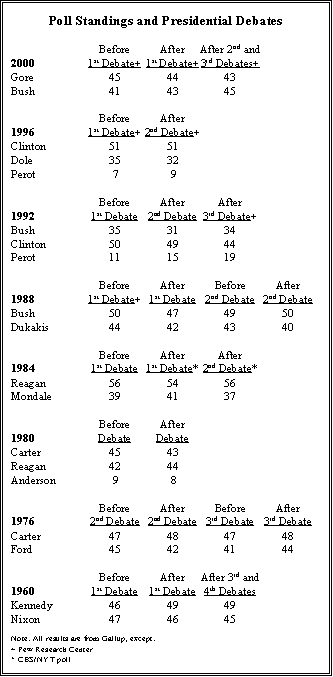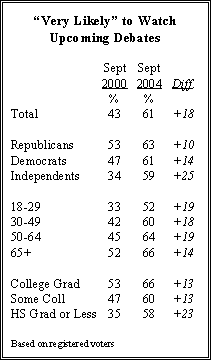 Campaign 2004 has all the earmarks of an election that could turn on the presidential debates. John Kerry’s electoral fortunes depend heavily on his ability to ease concerns about his leadership. He must also convince voters that Bush has mishandled the situation in Iraq and has not done a good job with many domestic issues, including the economy. For his part, George Bush must successfully defend his policies at home and abroad, and cast Kerry as ill-equipped to lead a nation at war.
Campaign 2004 has all the earmarks of an election that could turn on the presidential debates. John Kerry’s electoral fortunes depend heavily on his ability to ease concerns about his leadership. He must also convince voters that Bush has mishandled the situation in Iraq and has not done a good job with many domestic issues, including the economy. For his part, George Bush must successfully defend his policies at home and abroad, and cast Kerry as ill-equipped to lead a nation at war.
While the candidates emphasize these themes every day on the campaign trail, the debates guarantee them a vast and attentive audience. In the most recent Pew Research Center poll (Sept. 8-13), 61% said they are very likely to watch the debates, as compared with just 43% who said that prior to the presidential debates four years ago. Interest in the debates among independents, in particular, has increased dramatically from the 2000 campaign.
Historically, two factors distinguish those debates that have proven decisive in the election outcome. First, debates have had the greatest impact in close races, or in campaigns where the lead switched back and forth. Second, debates have been most influential in campaigns with unresolved questions about the personal character of one, or both, of the candidates. The upcoming Bush-Kerry debates would appear to fill the bill on both counts.
In 1960 and 1980, as today, the polls showed a very tight race before the debates began. But John Kennedy’s performance in 1960’s first debate gave him a slight lead over Vice President Nixon, which Kennedy never relinquished. Ronald Reagan trailed Jimmy Carter 45%-42% three days before their Oct. 28 debate. But after a strong performance in that campaign’s only debate, Reagan wiped away Carter’s lead and subsequently surged to victory.
In the elections of 1984 and 1996, incumbent presidents (Reagan and Clinton) came into the debates with solid leads, while their opponents were desperately seeking momentum. But neither Walter Mondale in 1984, nor Bob Dole 12 years later, was able to produce the requisite miracle. Clinton retained his pre-debate edge and Reagan added to his advantage despite some stumbles in the first debate.
In the month prior to the 1976 debates, President Ford had successfully cut into Jimmy Carter’s substantial lead. But Ford’s gaffe in that year’s second debate when he claimed that Eastern Europe was not dominated by the Soviets slowed his surge. In 1988, Michael Dukakis, who was already slipping in the polls, made his situation worse with his performance in that year’s second debate. Dukakis’s campaign never recovered from his seemingly cold response to a question about whether he would drop his opposition to the death penalty if his wife were raped and murdered. Finally, the 1992 debates had a limited impact on the support of the major candidates (Clinton and Bush), but they enabled Ross Perot to become a viable third-party challenger.
In general, success or failure in presidential debates centers on public perceptions of the candidates’ personal qualities. Issues, by and large, have played a secondary role. Kennedy’s superior television image in 1960, Reagan’s ability in 1980 to defuse doubts about his judgment and competence, and Bush’s apparent sense of detachment in 1992 are some of the notable personal impressions that emerged from these debates.
Al Gore entered the first presidential debate in 2000 with a small lead in the horse-race and a reputation as an effective debater. But after the first debate, many observers criticized Gore for his frequent sighs and know-it-all demeanor. As a result, while national polls found majorities or pluralities rating Gore as the “winner” of the first presidential debate, his electoral support slipped across the board.
 In the current campaign, questions abound about the candidates’ personal strengths and weaknesses. Polls consistently show voters giving John Kerry an edge on a number of domestic issues like Social Security, healthcare and the economy. Bush, on the other hand, is seen as the stronger leader and more capable of handling the war on terrorism. The latest national polls give a mixed view of where the presidential race stands going into these debates. The most recent Pew Research Center survey shows the race in a dead-heat (46%-46%), while other national surveys show Bush with a slight lead.
In the current campaign, questions abound about the candidates’ personal strengths and weaknesses. Polls consistently show voters giving John Kerry an edge on a number of domestic issues like Social Security, healthcare and the economy. Bush, on the other hand, is seen as the stronger leader and more capable of handling the war on terrorism. The latest national polls give a mixed view of where the presidential race stands going into these debates. The most recent Pew Research Center survey shows the race in a dead-heat (46%-46%), while other national surveys show Bush with a slight lead.
What is clear is that the debates will be watched closely, even by voters who in the past have paid relatively little attention in these events. Far more political independents say they are very likely to watch the debates than did so in 2000, and the gap in debate interest between independents and political partisans has disappeared. Similarly, educational differences have narrowed considerably, as voters with a high school education express far more interest in the debates than in 2000.
Overall, about three-in-ten voters (29%) say the debates will matter in their decision of whom to support, which is about the same as in 2000 and 1996. Young people (41%) and political independents (36%), in particular, say the debates will be important in making up their minds.